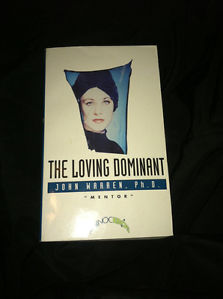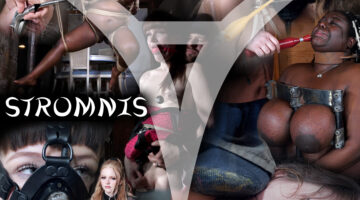John Warren, Author & Activist
Interviewed by Sensous Sadie
 SCENEprofiles Interview with John Warren, Author & Activist
SCENEprofiles Interview with John Warren, Author & Activist
Dr. John Warren has been in the Scene for over 30 years. He is an educator and lecturer in the Scene and the author of five books: The Loving Dominant, Torquemada Killer, Safe Sane and Consensual, Murder at Roissy and The Brat. He is the founder of Boston Dungeon Society and the manager of Diversified Services, which offers a variety of BDSM oriented toys, books and other products.
SENSUOUS SADIE: Many people think of you as one of the founding fathers of the BDSM scene, and in fact you started playing in 1964 and have been an active member of the public scene since around 1985. What would you say are the biggest changes in the community? Which ones are good, and which ones are bothersome?
JOHN: “I think the biggest change is that in 1964 there was no community at all. Even what people have come to call The Old Guard in the gay community was mostly small groups with little or no connection to each other. For the heterosexual people interesting in what we have come to call BDSM, there were only a few contact magazines, most of which were very limited geographically, and even these were largely aimed at the swinging population. Even now, I’m reluctant to use the word “community” to describe us except in the most general manner. After all, the phrase BDSM was intended to cast a wide net bringing together the stay-at-home/play-at-home, the attention sluts of the party/convention circuit, the people who occasionally spank their partner and those who like to style themselves 24/7 and everyone in between. Obviously, this group doesn’t share a lot of things. Heck, we don’t even come close to playing alike, and that’s the point were we come together closest.
“However, there are a lot more of us admitting our interests, and we have a lot more information with which to evaluate risks. Those are certainly upsides. I’m sure some people would have a long laundry list of downsides, but allowing for the increase in population and the greater ease in communicating, I’m not sure I’d agree. The One-True-Way contingent can be annoying, but thinking back, I think they have become much less influential. After all, in the Bad Old Days, most of us were one-true-wayers. We couldn’t help it. Without a way to share information, we all thought that the way we were doing it had to be the right way. Damn, it was the only way. We didn’ t know any better.
“The confidence people and the people who play with other’s emotions are certainly more common. The anonymous nature of the Internet cultivates that. However, they existed way back when. In some ways it was worse because blackmail was a very real possibility. In today’s society, we forget that people were sent to jail for exchanging personal, consensual photographs back in the 60’s. Many states treated adultery as a crime and BDSM people were seen as actual or potential murderers. Confidence game were very common. I recall one woman in California responding to an advertisement I had written with an offer to fly to North Carolina to be my slave if I’d pay her airfare. She included a picture which I recognized having been copied from a magazine. If 10 percent of a population is dishonest. Increasing the population by an order of magnitude means a comparable increase in the number of bastards.
“One thing has happened that concerns me. Back when we were isolated groups and couples. There was little need or even opportunity for one-upmanship. People were usually pretty considerate of one another. This does not mean they were more noble or anything like that, there just wasn’t that many of us at any one place. Today, the ‘I’m more experienced than you’ and ‘I’m safer than you’ crowd is loud and boisterous. It’s important for people to remember that by pushing someone else down does not raise the pusher one iota. Safety is important but it best put forward by teaching rather than attacking individuals. Experience is important but sometimes the best partner can be an aware and empathetic novice.”
Sadie: You are the founder of the Boston Dungeon Society. What did you find most satisfying, and most challenging about your leadership there? Are you still involved on a leadership level?
John: “No, I’m very proud to be ‘just a member.’ My model for public services is Cincinnatus, a retired Roman general who was plowing his field when approached by Senators offering him absolute rule. He put down his plow, took over the Empire and ruled it for several years, correcting many of the things that were wrong. When he was satisfied with the Empire’s condition, he resigned and returned to his plowing. Back in 1992, Libby and I realized there was a need for an organization like BDS so we started it. However, it was always our plan that eventually it would become a member-run organization. It took almost ten years to get the organization stable enough with a large enough treasury so it could survive the inevitable problems. However, in the last two years of ‘our’ BDS, we recruited and trained a Service Board that eventually became the corporation’s board of directors. Once they were in command, we stepped back and let them run their show.”
Sadie: When you first wrote The Loving Dominant in 1991, there was nothing in print for heterosexual BDSM players. Today that are tons of books, not to mention the Internet, and in fact I have heard people complaining that there is “too much information.” What would you recommend to novices in terms of getting acquainted with the lifestyle (aside from reading your books of course!)
John: “Actually, Jay Wiseman, beat me to print by over a year. Fortunately, his SM101 wasn’t available on the East Coast. I’m not sure I would have written Loving Dominant if I had known there was another excellent book out there. At that time, there was significant doubt that there was enough interest for two such books. Boy, were we wrong! As you note, now there are dozens of books. These, of course, as you note, are extremely valuable resources. However, books are only one way for people to learn. I’m a big supporter of offline groups, particularly those like BDS, TES, Black Rose and others whose primary focus is education. Not only are their classes wonderful places to learn but since they attract the more serious practitioners and so are excellent places for people to meet others. Another good learning venue are the regional and national conventions like Ohio Leatherfest and Black Rose. They can sometimes be a bit overwhelming but they provide a very rich learning environment.”
Sadie: You have written two non-fiction and three fiction books, as well as numerous articles. As a writer, is there a different experience for you between writing fiction and non fiction?
John: “Fiction writing can be a unique experience since the writer is essentially creating a special world. Sometimes the characters can take on a life of their own that is amazing. I recall when I was writing a scene in Torquemada Killer centered on the seemingly vanilla detective during which she visits a professional dungeon. I had planned for her to discover submissive tendencies. Imagine my amazement when she became a domme! It was as if I were reading the scene rather than writing it. That sort of thing never happens in nonfiction writing. However, the big enjoyment in nonfiction is getting a chance to explore things in detail as well as helping others do scenes that are both exciting and safe.”
Sadie: Do you get turned on writing your own erotic fiction?
John: “Actually, most of the time I’m writing about something that has already turned me on. Many of the scenes I write are actually fictionalized versions of scenes I’ve taken part in. However, the memories are fun to relive.”
Sadie: There are lots of websites that sell BDSM paraphernalia, why did you start your business Diversified Services? What do you offer that is unique?
John: “Actually, since I’m a reseller rather than a crafter, I doubt that anything I sell is unique. However, there aren’t many places that have as wide an assortment.”
Sadie: How would you describe your personal philosophy regarding BDSM?
John: “That’s a pretty broad question. I’ll just hit a few high points. I accept that there are many roads in this Brave New World and no one travels all of them. Heck, there are scenes that make me want to look away and walk out of the dungeon, but if both people are aware of the risks, accept them and consent, it is their business. I also like people to recognize that “intense” and “good” are not the same and to do a good scene one has to satisfy his or her needs and the needs of his or her partner and the intensity level is immaterial.
Sadie: Quite often novices think that a Dominant can just show up and be competent, but that submissives need to be “trained” to be a good submissive. In contrast, you write that, “I find that dominants are much more in need of training as what they need to know is more transferable.” Training on this toy or that is a practical thing to do, but teaching someone to know who they are and how to Dominate is a different ball of wax. What are your thoughts on helping novice Dominants develop these “soft” skills?
John: “Much of the time, this sort of thing cannot be taught. Much of it is inherent in the individual. Sadly, bad fiction has created a belief in a lot of novice dominants that they have to behave in a way that is actually contrary to how they really feel. The cruel, unfeeling, arrogant dominant can be a hot roleplay but it isn’t a way to live (or love.) Fortunately, off-line groups can also be places where people can see dominants who can serve as role models.”
Sadie: You write that “Doms do sometimes shortchange themselves in an effort to be a ‘good Dom.’ I tell people “Doms have safewords too.” Can you explain what you mean by this?
John: “Many dominants feel that to be ‘good doms’ they have to do everything. Well, nobody does everything, and attempting to do so is one of the major causes of hard feelings and bad outcomes. Dominants who get requests that they think are beyond their ability or even isn’t of interest to them shouldn’t feel any obligation to comply.
Sadie: Some people feel that by definition the Master/slave relationship is more “valid” than, say, a weekend warrior style of D/s play. You expand on this in your comments, “When people who prefer their play light or occasional are told that they aren’t doing quality scenes, there is a temptation to extend play to levels where neither of them are comfortable but are doing it because ‘they should.'” Why do you think that there is so much judging going on, and what can we do to change this?
John: “The judging is often a matter of insecurity. People who aren’t secure in their scene sometimes build themselves up by trying to tear others down. Changing it is often simply a matter of people saying it’s OK to take the path you want. Another way we can ‘put the word out’ is through role modeling. Light, skillful players can be proud of the way they play and let others know.
Sadie: Along the same lines, it seems like we sometimes demonize the more edge players such as people who do blood or breath play, bestiality and so on. This is a common cultural phenomenon when a group is looking for legitimacy and certain subgroups don’t help the cause. You can see this in the gay/lesbian culture with fringe groups such as cross-dressers often being criticized because they make the whole GLBTQ identity less palatable to vanilla people. What are your feelings about this?
John: “Anyone who thinks we can make people like the Concerned Women of American like us by turning on people who play heavier than us are living in a wonderful world. Unfortunately, it isn’t the same one most of the rest of us have to share. In fact, this sort of thing is exactly what the Right wants. Reverend Niomoler learned that in Germany during the war. As long as we don’t protest when ‘they’ come for ‘them,’ eventually, there may be no one to protest when ‘they’ come for ‘us.’
Sadie: You write in The Loving Dominant about how Dominants often believe that a BDSM relationship will be “easy” because the sub will do whatever they tell them to. This is a common misconception. Why do you suppose that people who otherwise would understand the complexities of human relationships would simplify the D/s one so much? Is this wishful thinking?
John: “Much of it is the fiction. Bad BDSM fiction paints a picture of lazy doms and hard working submissive. Some of the worst offenders are books like the Gor series and The Story of O. They can be hot, but they aren’t realistic. To learn BDSM from them is like trying to become an infantryman by reading Sargent Rock comic books.”
Sadie: You write in the introduction to The Loving Dominant some comments about your spiritual approach to BDSM: “This transfer of power doesn’t just have to be at the physical level of ‘You must do this’ and ‘You can’t do that.’ It can be on a much deeper spiritual level. Shortly after becoming my lover, Isobel showed me an ancient Hindu drawing of a couple making love; curved and straight lines led from various parts of one body, called Chakras, to the comparable parts of the other’s. She explained that they represented energy transfers the Hindus believed took place during sex. As I looked at the picture, I realized that during the scene I felt this energy transfer but hadn’t considered visualizing it in such a way. In some kind of metaphysical way, she seemed to be sending me a force that I returned to her through my actions in the scene.” Do you have a sense of spiritual themes in your private BDSM play? Is this something you integrate into your scenes?
John: “It’s hard to talk about “integrating” this into my scenes. It’s like asking if I integrate breathing into my daily life. It isn’t something that’s conscious.”
Sadie: You and Libby are both actively into poly relationships, you being a heterosexual Dominant and she being a bi-switch. What kind of agreements and boundaries have you set up to make this kind of complex relationship work?
John: “Lots! First off, I’ll recommend an excellent book “The Ethical Slut” by Catherine Lizst (Janet Hardy) and Dossie Easton. It’s a wonderful help for anyone in a poly relationship or for anyone contemplating one. As for ourselves, the primary rule is that the core relationship comes before anything else. All the ‘rules’ are built around that. For example, if someone wants to play with Libby or myself, he or she has to get permission from the other. This lets each of us know what the other is doing and with whom. Each of us has a veto on the play of the other. We’re also very much in love with each other and this is the lubricant that makes the whole thing work so smoothly.”
Sadie: The second edition of The Loving Dominant recently came out, with some updates from you. Having now been with your partner Libby for ten years, how have you found your relationship growing and changing in the BDSM sphere?
John: “On February 19th 1992, I got an email saying only ‘I think we share some interests in common.’ A week later, Libby and I met. We’ve been together ever since. It’s been a lot like a mountain over time. It starts out with a lot of peaks reaching high into the sky and then it weathers down to smoother surfaces and mist covered hillsides. Maybe the scenery isn’t as awe inspiring but it is still beautiful.”
Sadie: Your relationship is unusual in that it has lasted so long. It does seem that many relationships in the scene burn brightly and then burn out. What kinds of suggestions would you give to help people cope with the profound difference between a vanilla relationship and one which incorporates the D/s element?
John: “Actually, there aren’t big differences. It’s more important that people do what makes them feel comfortable than to try to fit the relationship into some kind of predefined limits. This also allows the relationship to change and grow over time.”
Sadie: You’ve written that, “I’ve seen a lot of BDSM relationships, with and without love, but in most cases the ‘no love’ group aren’t all that long lasting” Considering how many flavors of BDSM there are, it seems like quite the challenge to even date someone you like in the scene, much less find someone really compatible that you can also love. What advice can you give to people looking for a committed BDSM relationship?
John: “It is a hard search since we all have vanilla needs and then requiring that the person have complementary BDSM interests is difficult. Libby’s advice to women is ‘make a list of the top five things you want in a man. When you find someone with one of them, grab him.’ I’m not sure I’ll go that far, but I do know a lot of people who have such a long list that it’s unlikely they will ever find someone. Part of life is learning to make compromises. Another thing is I recommend that people take part in off-line groups. While it is unlikely that someone will find his or her perfect person at the first meeting, when you are mining for gold, you go to gold country. By taking part of groups, one also builds a reputation and this can greatly increase the chance of meeting an acceptable partner.”
Sadie: What is the role that Libby plays in your personal growth?
John: “We are a team. It’s hard to factor out anything where she’s involved since she is as much a part of my world as the air I breathe. Suffice it to say that she’s my rock. With her as a ‘safe place’ I feel free to explore and make changes.”
Sadie: You and Libby met online, but you have said that you are “leery of that method since it is so easy to deceive in this medium.” The Internet seems to have brought both a great freedom to our community as well as a great danger. What are your thoughts on the role of the Internet to our growing community?
John: “Your comment of freedom and danger are right on the money. The very anonymity that makes the internet so valuable to someone exploring their feelings can be a shield for those with baser intents. As with everything in BDSM, the important thing is to be aware of risks and think seriously about which are acceptable and which are not.”
Sadie: I have observed there is an unusual amount of politics clogging up our community. My theory is that this is exacerbated because we all have an underlying interest in the power exchange. In your work with various national groups and your wife Libby’s work with the national Leather Leadership Council, you must surely have run into a fair bit of this. Do you agree with my assessment? What do you think would help us to “all get along?”
John: “My feeling is that the politics are so intense because the reward are so small. After all, being a “leader” in our community provides only the tiniest amount of power and rarely more than a red cent. This means that the battles themselves become the goal. It isn’t pretty but it seems to be reality.”
Sadie: Thank you for speaking with me!
~~~~~~~~~~~~~~~~~~~~~
Sensuous Sadie is the author of It’s Not About the Whip: Love, Sex, and Spirituality in the BDSM Scene. She is the founder and leader (1999 – 2001) of Rose & Thorn, Vermont’s first BDSM group. Comments, compliments and complaints, as well as requests for reprinting can be addressed to her at SensuousSadie@aol.com . Sadie believes the universe is abundant, and that sharing information freely is part of this abundance, so she allows reprints of her writing in most venues.



















